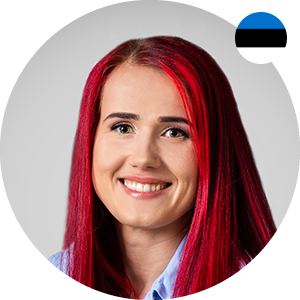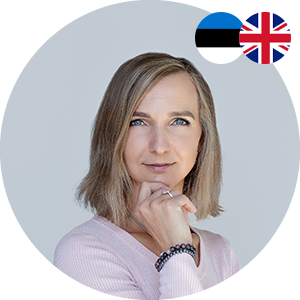MER Biofeedback® Therapy at Lifekeskus
Begin your journey to improved well-being and achieve lasting contentment
Are you struggling with feelings of fear, anxiety, panic, or sadness?
Are you suffering from burnout or mental exhaustion?
Have you lost your sense of joy and zest for life?
Are you held back by low self-esteem, feelings of inadequacy, guilt, shame, abandonment, or a lack of motivation?
Maybe you find it difficult to find balance in life or you don’t know exactly what you want from life?
We have a solution for you
We offer the unique MER Biofeedback® therapy (Mental and Emotional Release Biofeedback) in Estonia at Lifekeskus and the United Kingdom. For details about our UK services, visit: www.meslifemastery.co.uk
This methodology is the result of our extensive experience, which includes over 20 years and more than 21,000 therapy hours of practice with the biofeedback device.
MER Biofeedback® therapy combines biofeedback therapy with the principles of positive psychology and helps create new, supportive thought patterns.
MER Biofeedback® therapy is a safe, non-invasive, and non-manipulative method with no negative side effects. The use of the biofeedback device causes no discomfort, and clients feel comfortable and relaxed during the session.
It is suitable for all ages, from children aged 1+ to the elderly.
MER Biofeedback® therapy is a holistic approach to achieving and maintaining well-being. It consists of three parts:
1. Identifying emotional tensions and subconscious thought patterns
During the therapy session, the therapist uses a biofeedback device to identify the client’s emotional state and the thought patterns that affect them in real time. The therapy does not require the client to recall or describe past traumas or negative life experiences. As they go through the therapy sessions, the client becomes more aware of their inner world, including their beliefs and the emotional tensions that have developed over their life. This process lays the foundation for a better understanding of their past behavioural patterns, which leads to inner growth and positive changes.
2. Balancing emotional tensions and subconscious thought patterns
Using the biofeedback device, the client’s own body provides feedback on what causes them emotional tension and stress—in other words, what their negative thinking patterns, emotions, and limiting beliefs. After these sources of emotional tension and stress are identified with the biofeedback device, the therapist balances them.
3. Using Positive Psychology Principles and Forming Supportive Thought Patterns
During therapy, we identify your strengths, or inner resources. We help you consciously form new ways of thinking that support your well-being and help create a more positive and balanced daily life.
MER Biofeedback® therapy calms the mind, relaxes the body, and helps you control your emotional reactions to difficult or triggering situations and individuals. MER Biofeedback® therapy helps you find lasting emotional balance, leading to a greater sense of satisfaction and well-being.
The effectiveness of biofeedback therapy has been confirmed by tens of thousands of research studies. Thanks to its efficacy and safety, it is also widely recognised by many North American health insurance companies.
Clinical Evidence and Therapeutic Benefits of Biofeedback
1. Reduces Burnout and Increases Self-Regulation:
– Proven Effectiveness: Studies in journals like Applied Psychophysiology and Biofeedback have shown that biofeedback can reduce burnout symptoms, such as exhaustion and irritability, by 50-70%.
– Preventive Impact: A 2022 study published in Frontiers in Human Neuroscience highlighted that regular biofeedback therapy can reduce the risk of burnout in high-stress professions by up to 40%. It helps improve your focus and self-regulation.
– Physiological Control: Biofeedback helps to reduce the stress hormone cortisol in the body by up to 30-40% and increases emotional resilience by as much as 50-70%. This gives you greater control over your stress responses.
2. Fear, Anxiety and Panic Attacks Relief:
– An Effective Solution for Fears, Anxiety and Panic Attacks: Studies from Harvard Medical School and the American Psychological Association (APA) have shown that biofeedback therapy is effective in alleviating symptoms of fear, anxiety, and panic attacks. Clients learn to control physical reactions associated with stress, fears, anxiety, panic attacks giving them back a sense of control over their mind and body.
3. Supports Emotional Intelligence, Resilience and Well-being:
– Emotional Intelligence and Resilience: Research from institutions like UCLA and Emory University supports the underlying principles of how biofeedback contributes to emotional intelligence. Studies indicate that biofeedback therapy helps to increase emotional resilience by as much as 50-70%. Emotional resilience is a core component of emotional intelligence, reflecting an individual’s ability to adapt to stressful situations and bounce back from adversity.
– Well-being: Overall, biofeedback therapy integrates these scientifically proven principles to consciously restore body-mind balance, release negative thoughts, and and promote clarity and inner peace – all of which contribute to improved mental wellbeing.
4.Improves Cognitive Abilities, Concentration, Decision-Making and Problem-Solving:
– Clarity of Mind & Reduced Mental Fog: Biofeedback therapy helps to improve concentration and reduce the feeling of “mental fog”. This is essential for confident decision-making, better focus, and problem-solving.
– Faster Recovery: Studies show that biofeedback helps the body recover from stress up to 2 times faster after mentally demanding tasks. This ensures that you and your team is consistently performing at its peak.
How does MER Biofeedback® Therapy Differ from Other Types of Therapy?
Our trained MER Biofeedback® therapist, in collaboration with the biofeedback device, identifies and balances:
- Subconscious negative thinking patterns and limiting beliefs, also known as emotional triggers (automatic emotional responses).**
- Automatic emotional responses and negative behavioural patterns.
- Obsessive thoughts and compulsive behaviour.
In MER Biofeedback® therapy session, the therapist plays a key role in identifying stressors specific to the individual through the use of a biofeedback device. The biofeedback device itself cannot independently detect or balance the client’s stress indicators without the therapist’s assistance.
During therapy, the client does not need to recall or describe negative life events or traumatic experiences. This therapeutic approach means that the therapist does not have to ask questions about past events. Therefore, if you prefer not to speak during the session, you are not required to do so. In MER Biofeedback® therapy, the therapist uses the biofeedback device to provide insights about the client, rather than the client having to talk about themselves.
Lifekeskus (Estonia) and MES Life Mastery (United Kingdom) employ only certified MER Biofeedback® therapists who have undergone specific training. Service providers offering biofeedback therapy outside Lifekeskus and MES Life Mastery do not possess MER Biofeedback® therapy training and certification.
Thanks to our extensive experience, which includes over 20 years and more than 21,000 therapy hours of practice with the biofeedback device, we selected only those stress indicators from the device that provide clients with faster and more effective results.
What are Clients' Experiences with MER Biofeedback® Therapy?
Based on client feedback, this therapy is effective in addressing and preventing burnout, as well as alleviating mental exhaustion.
Clients experienced a significant reduction in anxiety, panic, and depression.
Based on feedback from our clients, we know that MER Biofeedback® therapy effectively identifies and balances negative thinking patterns, limiting beliefs, and emotions. For example, by releasing feelings like fear, sadness, anguish, abandonment, melancholy, anger, irritability, low self-esteem, feelings of inadequacy, guilt, shame, and victimhood, a person becomes less susceptible to automatic stress reactions. This helps them better control their emotions and reactions to certain situations or people. As a result, a person can focus on daily activities and make better choices and decisions.
Our clients also reported higher levels of self-confidence and superior performance in sports, business, and specialised fields.
Based on their own life experiences, every client has developed personal negative thought patterns, blockages, and emotions. MER Biofeedback® therapy provides support for a wide range of diverse issues.
Results of MER Biofeedback® Therapy and How Many Therapy Sessions Are Recommended
After just one session, many clients reported:
50–70% reduction in fears, anxiety, panic, and excessive worry.
50-70% reduction in burnout and mental exhaustion in individuals in high-stress professions or family responsibilities.
60-70% increase in self-regulation.
50–70% reduction in feelings like sadness, anguish, and melancholy.
50–60% increase in their sense of satisfaction and well-being.
Most clients have given us feedback after just one therapy session. They have described the results of the therapy as follows:
- Reduction compulsive thoughts, including the abundance of thoughts, the so-called flurry of thoughts, have subsided.
- Reduced burnout and mental exhaustion.
- Increased stress tolerance.
- Reduced fears, anxiety, panic attacks, excessive worrying, and phobias.
- Decreased feelings of sadness, melancholy, life weariness, and apathy.
- Increased self-regulation: Most clients managed their emotional responses more effectively in challenging situations or with difficult people.
- Redused feelings of abandonment and loneliness.
- Reduced feelings of grief and loss.
- Reduced feelings of grief and loss.
- Improved self-esteem and reduced feelings of inadequacy.
- Improved self-confidence and self-belief.
- Increased self-confidence and superior performance in sports, business, and specialised fields.
- Improved decision-making, and problem-solving.
- Reduced feelings of shame and worthlessness.
- Reduced emotional outbursts, including anger, rage, or frustration.
- Increased sense of satisfaction and well-being.
- Improved joy, positivity, and a renewed drive to take action, along with a deeper sense of motivation.
- Increased emotional intelligence.
- Increased learning capacity.
- Increased courage to make desired changes, thereby enhancing one’s own quality of life and leading to concrete actions for life changes.
- Reduced hyperactivity, restlessness, and impulsivity.
- Improved attention span and concentration.
- Enhanced cognitive skills, including the ability to read, comprehend, relate to existing knowledge, remember, and utilise various types of information (texts, numbers, spatial objects, etc.).
Based on client feedback, noticeable and lasting changes occur within one to five sessions, depending on the client’s emotional state and therapeutic goals.
We recommend three sessions to achieve lasting and meaningful results.
Children aged 3 to 10 typically require just one to two sessions to address issues such as fears, phobias, anxiety, panic, low self-esteem, and Tic disorders (including Tourette syndrome).
The interval between sessions typically ranges from three to six weeks, depending on the purpose of the therapy.
The number of sessions required is uniquely individual, depending on your specific needs and the duration and intensity of the challenges you’re facing.
Long-term depression, and other persistent negative emotional states often result in deeply rooted thought patterns and limiting beliefs. Addressing these complex underlying layers to balance stress indicators typically requires more time.
For individuals experiencing significant stress in their life or work, therapy should be delivered more systematically to provide consistent support.
How are Stress Indicators Tested and Balanced?
A therapist uses a biofeedback device to measure the body’s reactions based on an “action and reaction” principle, which functions as a dialogue between the device and you.
The Action (Stimulus) is a signal sent by the device, which is programmed to correspond with various emotions, thought patterns, or limiting beliefs. Your body “hears” these signals as questions.
The Reaction (Response) is your body’s subconscious answer to these signals. The biofeedback device transmits this information to the therapist in the form of descriptions and percentages.
This “question and answer” cycle allows the therapist to identify your emotional tensions and negative thought patterns that you may not consciously notice.
After identifying the stressors, the therapist uses the device to send balancing or harmonising counter-signals. This helps to balance emotional tensions, negative thought patterns, emotions, and limiting beliefs.
Information exchange between the biofeedback device and the client occurs via sensors on the head, wrists, and ankles. The sensors are made of a special conductive silicone, which allows for communication with low frequencies through the computer’s USB port and a multi-functional interface box.
The device used at the MES Life Mastery is a stress and tension-balancing biofeedback device, certified with a CE conformity certificate valid across the EU.
Description of the Therapy Session
At the start of a MER Biofeedback® therapy session, the client is seated in an armchair. Sensors are then placed around the client’s head, wrists, and ankles to connect to the computer.
MER Biofeedback® therapy is a safe, non-invasive, and non-manipulative method with no negative side effects.
The use of the biofeedback device causes no discomfort, and clients feel comfortable and relaxed during the session. Using the device during therapy is analogous to using a smartwatch.
For toddlers, the sensors are attached around the head or abdomen.
During the session, the therapist speaks positively about the client, ensuring a safe and comforting environment.
Children may play during the therapy if they wish. Clients are welcome to bring a toy or game that interests their child.
Throughout the therapy, the therapist provides each client with personal, positive recommendations to improve their quality of life.
After a session, most people feel relaxed.
MER Biofeedback® therapists guide you towards inner balance and well-being, empowering you on a journey of self-discovery and positive transformation.
At the first session, the therapist provides the client with a leaflet titled “New Programmes”, which helps the client begin developing positive new ways of thinking, acting, and being. The information provided assists the client in identifying suitable affirmations, as well as new positive and supportive aspects and activities to improve their quality of life.
After the therapy session, the client receives a detailed written report of the stressors identified and balanced.
MER Biofeedback® Therapy can be used in conjunction with medications, conventional medicine, and complementary therapies. It is suitable for all ages, from toddlers to the elderly.
MER Biofeedback® therapy is not recommended for:
• Pregnant women.
• Individuals with pacemakers, glucose monitors, or transplanted organs.
• MER Biofeedback® therapy is not a substitute for medical care and should not be used for diagnosis or ongoing treatment.
Tartu branch of Lifekeskus
Formation of Unconscious Thought Patterns and Their Influence
Unconscious thought patterns and beliefs often form through repeated exposure to specific ideas, behaviors, or emotional responses during key developmental periods or significant life experiences. These patterns can influence decision-making, emotional reactions, and behaviors without us being fully aware of their origins.
Unconscious thought patterns and limiting beliefs are programmes based on emotions and experiences that arise when we see, hear, feel, or experience something. Thus, life experiences shape our beliefs. The quality of these beliefs depends on the environment in which we were raised or the circumstances in which we currently live. Our thought patterns and beliefs are those thoughts that we consciously or unconsciously accept as truth in our lives. Whether we are aware of it or not, they can obstruct our ability to live freely and comfortably.
These programmed triggers, even if we are not aware of them, guide our decisions and behaviours, and shape our lives. The feeling of lack is one of the most common programmes that we involuntarily impose on ourselves and significantly affects our lives. It is an unconscious limiting belief such as: ‘He is smarter than me’, ‘She is more beautiful than me’, ‘He is richer than me’, etc.
Our therapists
Only trained and certified MER Biofeedback® therapists work at the Lifekeskus.
Angelika
Randjärv
Angelika has found her heart's calling through practicing MER Biofeedback® therapy.
Veronika
Allas
Veronika knows from experience that it is possible to achieve inner contentment with the help of MER Biofeedback® therapy.
Kristo Epner
As a MER Biofeedback® therapist, Kristo aims to encourage clients to make changes to improve their quality of life.

Marili
Otstavel
As a MER Biofeedback® therapist, Marili hopes to help clients achieve self-discovery and boost their self-confidence.





